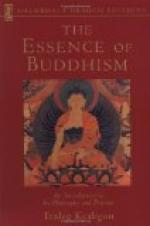In grief as well as in joy we are
united,
In sorrow and in happiness alike.
* * * *
That which your heart rejoices in as good,
That I also rejoice in and follow.
It were better I should die with you,
Than ... attempt to live where you are not.
—Fo-pen-hing-tsih-king.
When first I undertook to obtain wisdom,
Then also I took on me to defend (the weak).
All living things of whatsoever sort
Call forth my compassion and pity.
—Ta-chwang-yan-king-lun.
Fault is not to be found unnecessarily—Ta-chwang-yan-king-lun.
Judge not thy neighbor.—Siamese Buddhist Maxim.
What is it to you ... whether another is guilty or guiltless? Come, friend, atone for your own offense.—Mahavagga.
Even a king may be full of trouble; but a common man, who is holy, has rest everlasting.—Fo-sho-hing-tsan-king.
This world is afflicted with death and decay; therefore the wise do not grieve, knowing the terms of the world.—Salla-sutta.
Who that clings to Righteousness should be in fear of death?—Jatakamala.
Ye, then, my followers, ... give not way ... to sorrow; ... aim to reach the home where separation cannot come.—Fo-sho-hing-tsan-king.
Loving and merciful towards all.—Fo-sho-hing-tsan-king.
Filled with universal benevolence.—Fa-kheu-pi-u.
A friend to all creatures in the world.—Saddharma-pundarika.
Bent on promoting the happiness of all created beings.—Lalita
Vistara.
Conquer thy greediness for sensual pleasures.—Jatukannimanavapuccha.
Therefore should we encourage small desire, that we may have to give to him who needs.—Fo-sho-hing-tsan-king.
Justly I seek for riches, and having sought for riches justly, I give of my ... justly acquired wealth to one, to two, to three, ... to a hundred.—Magha-sutta.
They sought their daily gain righteously; no covetous, money-loving spirit prevailed; with pious intent they gave liberally; there was not a thought of any reward.—Fo-sho-hing-tsan-king.
There is in charity a proper time and a proper mode.—Fo-sho-hing-tsan-king.
Better would it be to swallow a red-hot iron ball than that a bad, unrestrained fellow should live on the charity of the land.—Dhammapada.
Our duty to do something, not only for our own benefit, but for the good of those who shall come after us.—Fo-pen-hing-tsih-king.
Have respect for the aged as though they were thy father and mother; love the young as thy children or younger brethren.—Jitsu-go-kiyo.
All the people were bound close in family love and friendship.—Fo-sho-hing-tsan-king.
Happy ... is the man that honors his father: he also that honors his mother is happy.—Udanavarga.
How should I be capable of leaving thee in thy calamity?... Whatever fate may be thine I am pleased with it.—Jatakamala.




